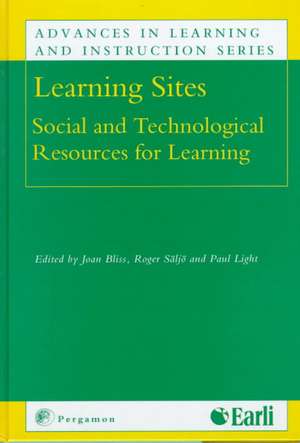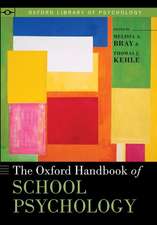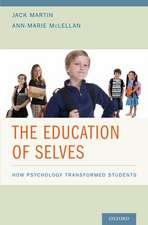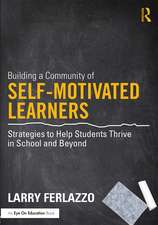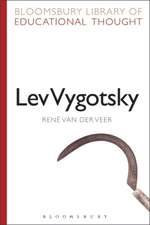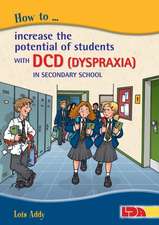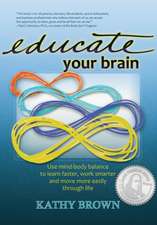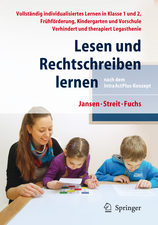Learning Sites: Advances in Learning and Instruction, cartea 3
Autor Joan Bliss, Roger Shaljho, Paul Lighten Limba Engleză Hardback – 12 oct 1999
The book begins by asking whether the context determines the nature of the knowledge to be learned, such that different sets of contextual practices related to the knowledge in question need to be acquired in order for learning to be successful. Next, it describes the forms of reasoning and learning in social and physical contexts, including but not limiting itself to logical reasoning, and asks how particular types of context constrain or activate different forms of reasoning and learning. It then looks at people learning with computers, examining how IT resources enhance or hinder learning. Finally, it compares human learning with learning done by machines in specific contexts.
Preț: 996.30 lei
Preț vechi: 1293.90 lei
-23% Nou
Puncte Express: 1494
Preț estimativ în valută:
190.64€ • 199.76$ • 157.60£
190.64€ • 199.76$ • 157.60£
Carte tipărită la comandă
Livrare economică 12-26 aprilie
Preluare comenzi: 021 569.72.76
Specificații
ISBN-13: 9780080433509
ISBN-10: 0080433502
Pagini: 328
Dimensiuni: 156 x 234 x 19 mm
Greutate: 0.64 kg
Editura: Emerald Group Publishing Limited
Seria Advances in Learning and Instruction
ISBN-10: 0080433502
Pagini: 328
Dimensiuni: 156 x 234 x 19 mm
Greutate: 0.64 kg
Editura: Emerald Group Publishing Limited
Seria Advances in Learning and Instruction
Cuprins
Part headings and selected papers: The humanߝtechnological dialectic (J. Bliss, R. Säljö). Learning and the Negotiation of Meaning. Introduction (R. Säljö). Learning mathematics in and outside school: two views on situated learning (G. de Abreu). Situated selves: learning to be a learner (C. Sinha). Negotiating identities and meanings in the transmission of knowledge: analysis of
interactions in the context of a knowledge exchange network (N. Muller, A.-N. Perret-Clermont). Real-world knowledge and mathematical problem-solving in upper primary school children (E. De Corte et al.). Quantifying time as a discursive practice: arithmetics, calendars, fingers and group discussions as structuring resources (J. Wyndhamn, R. Säljö). Learning and Reasoning in Context. Introduction (P. Light). Situated learning in instructional settings: from euphoria to feasibility (A. Renkl et al.). Engaging with organisational memory (A. Rizzo et al.). The relevance of relevance in children's cognition (A. Blaye et al.). Empirical abstraction and imaginative denial of rules (J. Bliss et al.). Enactive representations in learning: pretence, models and machines (E.K. Ackermann). Contextual knowledge in the development of design expertise (A. Eteläpelto, P. Light).
Learning with and by Machines. Introduction (J. Bliss). Gender and IT: contextualising differences (K. Littleton, M. Bannert). Information technology and the culture of student learning (C. Crook, P. Light). Assisting child-computer collaboration in the zone of proximal development (The Vygotskian Inspired System (VIS)) (R. Luckin). Learning and discovering with computational aids (V. Corruble, J. Bliss). Situated cognition: a challenge to artificial intelligence? (D. Cañamero, V. Corruble). Situated learning in autonomous agents (B. de Boer, D. Cañamero). References. Author index. Subject index.
interactions in the context of a knowledge exchange network (N. Muller, A.-N. Perret-Clermont). Real-world knowledge and mathematical problem-solving in upper primary school children (E. De Corte et al.). Quantifying time as a discursive practice: arithmetics, calendars, fingers and group discussions as structuring resources (J. Wyndhamn, R. Säljö). Learning and Reasoning in Context. Introduction (P. Light). Situated learning in instructional settings: from euphoria to feasibility (A. Renkl et al.). Engaging with organisational memory (A. Rizzo et al.). The relevance of relevance in children's cognition (A. Blaye et al.). Empirical abstraction and imaginative denial of rules (J. Bliss et al.). Enactive representations in learning: pretence, models and machines (E.K. Ackermann). Contextual knowledge in the development of design expertise (A. Eteläpelto, P. Light).
Learning with and by Machines. Introduction (J. Bliss). Gender and IT: contextualising differences (K. Littleton, M. Bannert). Information technology and the culture of student learning (C. Crook, P. Light). Assisting child-computer collaboration in the zone of proximal development (The Vygotskian Inspired System (VIS)) (R. Luckin). Learning and discovering with computational aids (V. Corruble, J. Bliss). Situated cognition: a challenge to artificial intelligence? (D. Cañamero, V. Corruble). Situated learning in autonomous agents (B. de Boer, D. Cañamero). References. Author index. Subject index.
